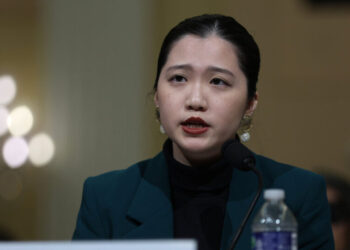George Benjamin’s “Divisions,” a new piano work for four hands, was meant to have its North American premiere last week at the Library of Congress. Then the government shut down.
So instead, the piece will have that premiere at 92NY in Manhattan on Wednesday, with Benjamin performing it with his friend Pierre-Laurent Aimard to close Aimard’s recital there. Uncertain whether the concert in Washington would happen, they went there anyway and ended up using their trip to practice.
“It’s a very nice feeling to enjoy being here together,” Aimard said in a video interview, “and not having the weight of a concert.”
They probably would have had a good time together, regardless. Benjamin, from England, and Aimard, from France, have been friends since the mid-1970s, brought together when they studied with two luminaries in Paris: the composer Olivier Messiaen and the brilliant pianist Yvonne Loriod, Messiaen’s spouse and muse.
As they grew older, Benjamin and Aimard, now in their mid-60s, continued to learn from and inspire each other. It’s a relationship that has led to some of the finest keyboard music of our time, like “Shadowlines,” a seductive and delicate solo that Aimard will perform at 92NY.
In the video interview, they sat next to each other and discussed their history with Messiaen and Loriod, and with each other. Here are edited excerpts from the conversation.
You were both teenagers, which is to say impressionable, when you began studying with Messiaen and Loriod. How did that shape your worldview?
GEORGE BENJAMIN There was a sort of radiance about Messiaen. His music is monumental and magnificent and so colorful and so bold, but as a man he was incredibly courteous and gentle and kind. His classes at the Conservatoire lasted about five hours, three times every week, and they went by like five minutes. There was lots of technical stuff: harmonic, rhythmic, orchestrational, all sorts of things, but the greatest lesson was about everything being done out of enthusiasm and love of music.
PIERRE-LAURENT AIMARD Yvonne was the person who inspired him, of course. His pianistic style changes when he meets her and somewhere incorporates her pianistic world. And this music became, in a very natural way, my mother language.
George, Messiaen was a champion of yours when you were still a student.
BENJAMIN He didn’t want, as some teachers do, to produce duplicates. I already understood I needed to find my own world and my own voice. His belief in me, his generosity to me after I stopped being his student — you can’t imagine what that meant to me when I was 16. That this genius saw some value in what I did was immeasurably helpful for the start of my work. I’ve never met anybody like that, an almost infinite resource of kindness and support for young people.
After you finished with school, how did you two continue your relationship with each other?
BENJAMIN Pierre-Laurent was in Ensemble Intercontemporain, Pierre Boulez’s group, and he was obviously amazing in that. I wrote a piece for the ensemble [“Antara”] in which I made an instrument for Pierre-Laurent to play, and he accompanied me on that journey very closely for two or three years until it was performed. And from there it’s very simple: Anything I’ve written for keyboard has been written for him.
Like “Shadowlines.”
AIMARD This piece is a funny story. George, you were composing “Palimpsests,” and when George has a big piece to write, he disappears for a while. He will be much like a hermit for a couple of months, if not years. But he called me in the middle of the process and told me: “You will receive a parcel. I sent you something.” What could it be, chocolate? No, a score. It was a masterpiece, and it was a complete surprise.
BENJAMIN I wrote it for myself. This piece had no commission, no context, anything. It just sort of started and kept on going, and I wrote it in three or four months, with quite a lot of intensity. I’d been studying Webern, and looking at Bach and into canons, and it occurred to me that there could be other types of canon that hadn’t been thought of before. Then this piece came out, and it was very different from anything I’d written for the piano before. And it was automatic that Pierre-Laurent would hopefully give the world premiere.
AIMARD Then there was “Duet,” which is supposed to be a piano concerto but is the most anti-concerto I know. And now there is this new piece. You had finished composing an opera.
“Picture a Day Like This,” from a couple of years ago?
BENJAMIN Yes.
AIMARD And you wanted to concentrate on a formal piece. You called me and said, “What about a four-hands piece?” And I found the idea marvelous because there is a divine repertoire for four hands, though limited, especially since recordings killed four-hands piano music because people didn’t need transcriptions for house music anymore. [Traditionally four-hand arrangements of symphonic works were made for home entertainment.]
BENJAMIN I’ve always adored playing duets with friends.
And did you want to play “Divisions” with Pierre-Laurent specifically?
BENJAMIN Was it you that suggested that I play the other part?
AIMARD Yes.
BENJAMIN That must have been before I wrote it, because there are lots of notes, but he has 85 percent of them.
Pierre-Laurent, four-hands repertoire is such an intimate style of playing, being for the home, as you said. How did your relationship express itself in this piece?
AIMARD It’s fascinating to share the same instrument. Because if you share the same piece with other instrumentalists, even with another pianist, you don’t share the same acoustic phenomenon of your own instrument. Here, it is the same soundboard that is activated by both our gestures.
BENJAMIN Something I didn’t calculate while writing was that it’s such an enjoyable medium. Not only the sound, which is affected by the fact that there’s so much going on that two hands could never do, but the proximity and the energy, and the degree of sharing that goes on even within a within a beat, a tiny beat.
AIMARD The smallest impulse transforms into vibration in a soundboard that you share, and on which you have an impact and an influence. So this is something really special, and extremely sensitive.
BENJAMIN I write operas, and I love drama in music. I can’t think of music without an intense dramatic side, and there’s a whole section in the middle where he plays fortissimo, resonant and strong, and I have to try to play soft and legato all the way through, like two entirely different worlds coexisting in a way that seems theatrical to me.
How did this make you feel about the vitality of four-hands repertoire?
BENJAMIN I wish I’d written it earlier. I really took pleasure not only in writing it, but in playing it. There have been lots of string quartets in the last 50, 60 years. But this medium has been almost ignored for 100 years or so.
AIMARD Well, Gyorgy Kurtag has written marvelous pieces for four hands.
BENJAMIN Yes, but it’s also been neglected. So there’s room for some more.
Joshua Barone is an editor for The Times covering classical music and dance. He also writes criticism about classical music and opera.
The post A 50-Year Friendship, Recorded in Music appeared first on New York Times.




